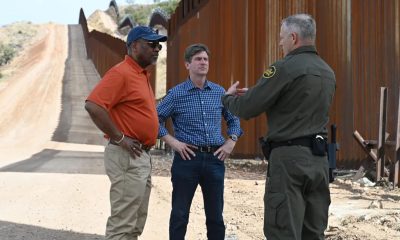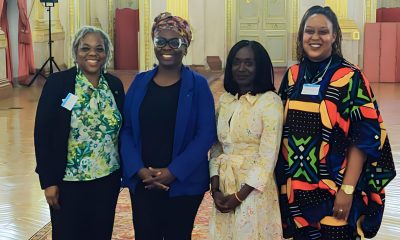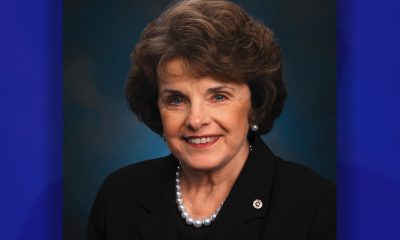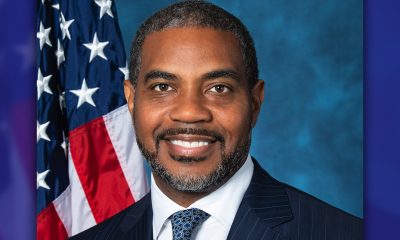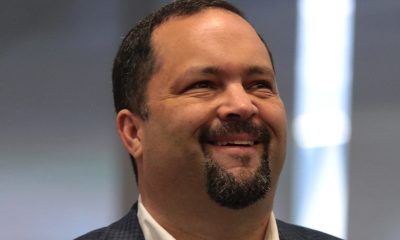World
How Countries Cope with Migrants Arriving by Boat

In this June 13, 2012, file photo, a Rohingya Muslim man who fled Myanmar to Bangladesh to escape religious violence, cries as he pleads from a boat after he and others were intercepted by Bangladeshi border authorities in Taknaf, Bangladesh. Two recent shipwrecks in the Mediterranean Sea believed to have taken the lives of as many as 1,300 asylum seekers and migrants has highlighted the escalating flow of people fleeing persecution, war and economic difficulties in their homelands. (AP Photo/Anurup Titu, File)
ROD McGUIRK, Associated Press
Two recent shipwrecks in the Mediterranean Sea believed to have taken the lives of as many as 1,300 asylum seekers and migrants highlight the growing number of people fleeing persecution, war and economic difficulties in their homelands.
Over the years, thousands of people in Asia have also used boats to escape. Here’s a look at where many go, and how they are treated once they arrive.
AUSTRALIA
COUNTRIES OF ORIGIN: Iraq, Iran, Pakistan, Afghanistan, Sri Lanka, China, Somalia, Sudan, Myanmar and Vietnam.
DESTINATIONS: Most of the boats leave Indonesian ports for Christmas Island, an Australian territory 345 kilometers (215 miles) south of the Indonesian island of Java, or Ashmore Reef, a collection of Australian islands east of Christmas Island. They often arrive without passports, which makes repatriating them more difficult.
GOVERNMENT RESPONSE: Since July 2013, Australia has refused to allow refugees who arrive by boat to settle on the mainland, and it has been turning back boats since the current government was elected in September 2013.
It has a detention camp for asylum seekers on Christmas Island and pays Papua New Guinea and the Pacific island nation of Nauru to run similar camps where asylum seekers wait while their applications for refugee status are processed.
Australia has an agreement to pay Cambodia to take refugees detained on Nauru, and with Papua New Guinea to resettle those camped out in there. So far none have gone to Cambodia, while some have been resettled in Papua New Guinea.
Australia is much more welcoming of asylum seekers who arrive by plane, although it still requires an initial period of detention. Once out of detention, some are allowed to work while others rely on welfare, including free medical care, but they are not eligible for government housing and must find accommodation in the private rental market.
INDONESIA
COUNTRIES OF ORIGIN: Afghanistan, Iran, Myanmar, Sri Lanka and Middle Eastern countries.
DESTINATION: Australia
GOVERNMENT’S RESPONSE: Indonesia, with its thousands of islands and long stretches of unpatrolled coastlines, is a key transit country for asylum seekers and migrants wanting to get to Australia.
The country hasn’t signed the 1951 U.N. Refugee Convention and doesn’t legally recognize asylum seekers or refugees. But it does operate 13 detention centers around the country that temporarily house them while the U.N. High Commissioner for Refugees office processes their applications for refugee status and eventual resettlement in a third country such as the U.S. or Canada. Thousands more live on their own outside the detention centers.
MALAYSIA
COUNTRIES OF ORIGIN: Mostly Myanmar, but also from Sri Lanka, Pakistan, Somalia, Syria, Iraq, Iran, Afghanistan, Yemen and Sudan.
DESTINATIONS: Most register with the UNHCR for resettlement in a third country while others travel through Malaysia to Indonesia in a bid to reach Australia.
GOVERNMENT RESPONSE: As in Indonesia and Thailand, asylum seekers and refugees have no legal status in Malaysia, putting them at risk of arrest and detention.
There are no refugee camps in Malaysia, and more than 100,000 of these “urban refugees” live in overcrowded, low-cost apartments or houses across the country. Their children do not have access to formal education. Barred legally from working, many earn money doing dirty or dangerous jobs that locals shun, while they wait for possible resettlement through the UNHCR — typically a process that lasts several years.
EUROPE
COUNTRIES OF ORIGIN: Mainly Syria, Iraq, Eritrea and Somalia. Palestinians also have attempted to flee to Europe.
DESTINATION: Closest point of landfall, which usually means Italy, Greece or Malta. Many travel overland to Bulgaria and Hungary, favoring destinations like Britain, France, Germany, Sweden and other Nordic countries.
EUROPEAN UNION’S RESPONSE: Asylum seekers and migrants arriving in Europe without visas are interviewed and finger-printed by authorities. EU nations have “reception centers” to house migrants where they are fed and given health care while their applications for asylum are being assessed.
Some migrants are given temporary permits allowing them to stay while their cases are studied. The country where they land is responsible for handling this, including providing free legal assistance. The process should not exceed 11 months. Those who do not qualify for residency of some kind are in some cases invited to leave Europe voluntarily, with some incentives. Others are expelled, sometimes put on a plane and flown to their home nation.
INDIA
COUNTRY OF ORIGIN: Sri Lanka
DESTINATION: India
GOVERNMENT RESPONSE: After Sri Lanka’s civil war erupted in 1983, hundreds of thousands from the ethnic Tamil minority fled the fighting between the majority Sinhalese government and Tamil rebels demanding an independent homeland. The refugees arrived in waves — many aboard crowded, rickety wooden boats that crossed the narrow bay between Sri Lanka and India — and landed on the beaches of Tamil Nadu state.
The Indian government erected more than 100 refugee camps, where authorities questioned people to make sure they were not linked to the rebels. Once cleared, they were given living quarters, monthly rations and the chance to find work in the community.
With ethnic, cultural and linguistic ties to India’s Tamils in the southern state, many refugees assimilated and took Indian citizenship. Others opted for repatriation offered at various times, including after Sri Lankan Tamil rebels in 1991 assassinated former Indian Prime Minister Rajiv Gandhi. The arrivals ceased when the Sri Lankan government crushed the rebels and ended the war in 2009.
BANGLADESH
COUNTRY OF ORIGIN: Myanmar
DESTINATION: Bangladesh
THE GOVERNMENT’S RESPONSE: Hundreds of thousands of Rohingya, a long-persecuted Muslim minority group in Myanmar, have fled to Bangladesh in recent years to escape persecution in the predominantly Buddhist nation. Roughly 400,000 Rohingya are believed to have gone to Bangladesh, where many of their ancestors came from, but only about 30,000 are officially recognized as refugees. The luckiest live in designated refugee camps, which include schools and clinics, but most either live in squalid informal camps or in poor, crowded neighborhoods.
In 2012, when waves of Rohingya sought shelter in Bangladesh, border authorities reportedly forced more than 1,300 back into the sea in their creaky vessels. Prime Minister Sheikh Hasina denied the refugees had been driven away, but made clear she didn’t want them, saying the country, already densely populated, “cannot bear this burden.”
VIETNAMESE REFUGEES
DESTINATION: United States, Canada, Australia
FLIGHT AND RESPONSE: The mass exodus of Vietnamese “boat people” began in 1978, a few years after the end of the Vietnam War, with hundreds of thousands of people fleeing to escape persecution by the victorious Communist government. Another wave followed in the late 1980s. The United Nations refugee agency says at least 840,000 left by sea.
The majority initially landed in Hong Kong and several Southeast Asian nations that established refugee camps and threatened to push them back, but most eventually settled in the United States, Canada and Australia.
_______
McGuirk reported from Canberra, Australia. Associated Press writers Raf Casert in Brussels, Eileen Ng in Kuala Lumpur, Malaysia, Niniek Karmini in Jakarta, Indonesia, Todd Pitman in Bangkok and Katy Daigle and Tim Sullivan in New Delhi contributed to this report.
Copyright 2015 The Associated Press. All rights reserved. This material may not be published, broadcast, rewritten or redistributed.
Barbara Lee
Congresswoman Barbara Lee Issues Statement on Deaths of Humanitarian Aid Volunteers in Gaza
On April 2, a day after an Israeli airstrike erroneously killed seven employees of World Central Kitchen (WCK), a humanitarian organization delivering aid in the Gaza Strip, a statement was release by Rep. Barbara Lee (D-CA-12). “This is a devastating and avoidable tragedy. My prayers go to the families and loved ones of the selfless members of the World Central Kitchen team whose lives were lost,” said Lee.

By California Black Media
On April 2, a day after an Israeli airstrike erroneously killed seven employees of World Central Kitchen (WCK), a humanitarian organization delivering aid in the Gaza Strip, a statement was release by Rep. Barbara Lee (D-CA-12).
“This is a devastating and avoidable tragedy. My prayers go to the families and loved ones of the selfless members of the World Central Kitchen team whose lives were lost,” said Lee.
The same day, it was confirmed by the organization that the humanitarian aid volunteers were killed in a strike carried out by Israel Defense Forces (IDF). Prior to the incident, members of the team had been travelling in two armored vehicles marked with the WCF logo and they had been coordinating their movements with the IDF. The group had successfully delivered 10 tons of humanitarian food in a deconflicted zone when its convoy was struck.
“This is not only an attack against WCK. This is an attack on humanitarian organizations showing up in the direst situations where food is being used as a weapon of war. This is unforgivable,” said Erin Gore, chief executive officer of World Central Kitchen.
The seven victims included a U.S. citizen as well as others from Australia, Poland, the United Kingdom, Canada, and Palestine.
Lee has been a vocal advocate for a ceasefire in Gaza and has supported actions by President Joe Biden to airdrop humanitarian aid in the area.
“Far too many civilians have lost their lives as a result of Benjamin Netanyahu’s reprehensible military offensive. The U.S. must join with our allies and demand an immediate, permanent ceasefire – it’s long overdue,” Lee said.
Bay Area
Nigerian Bank Chief Killed in Helicopter Crash on Way to Superbowl XVIII
According to the San Bernardino County Sheriff’s Dept., the crash occurred near Nipton, on the edge of the Mojave Desert Preserve. The poor weather conditions — rain, wind and snow showers—may have contributed to the accident, although the investigation is not complete. All six aboard were killed. Herbert Wigwe, 57, founded Access Bank in 1989, and it became the country’s largest competitor, Diamond Bank in 2018.
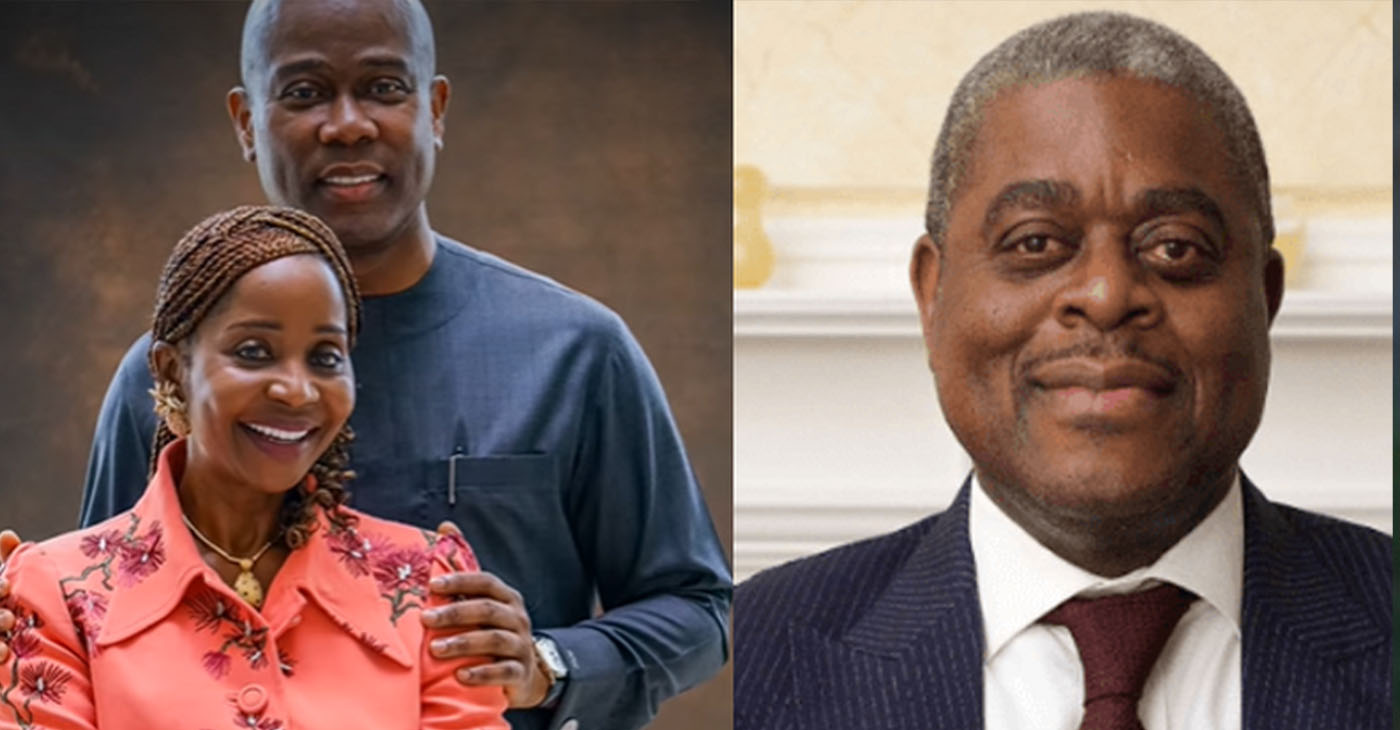
By Post Staff
The co-founder of one of Nigeria’s largest banks died with his wife, son and three others when the helicopter transporting them from Palm Springs, Ca., to Boulder City, Nev. to attend the fifty-eighth SuperBowl at the stadium outside Las Vegas crashed on Feb. 9.
According to the San Bernardino County Sheriff’s Dept., the crash occurred near Nipton, on the edge of the Mojave Desert Preserve. The poor weather conditions — rain, wind and snow showers—may have contributed to the accident, although the investigation is not complete. All six aboard were killed
Herbert Wigwe, 57, founded Access Bank in 1989, and it became the country’s largest competitor, Diamond Bank in 2018.
More recently, Wigwe was planning to open a banking service in Asia this year after making successful expansions to other parts of Africa, including South Africa, Kenya, and Botswana.
Nigerian President Bola Tinubu described Wigwe’s death as an ‘overwhelming tragedy.”
Oakland resident and Nigerian immigrant Kayode Gbadebo agrees with Tinubu. He met Wigwe in Nigeria but crossed paths with him in London in 2006. Wigwe, he said, “took risks.”
He was young and people thought he couldn’t do what he intended, which was not so much about money but community.
“He was more like Jesus in washing the feet of the poor– Wigwe was culturizing community,” Gbadebo said.
“There will never be another like him. This is a deep, deep loss” and he hopes everyone will eventually “be comforted.”
He was also disappointed that a replacement has already been named even before Wigwe is buried. “It is not reasonable. You don’t want a vacuum, but it’s” not fair to the family, Gbadebo observed.
Wigwe had also been working to solve the migration issues from African countries, believing that “investing in higher education was key to controlling mass migration, which “is destabilising countries across the world,” BBC News reported.
“We need to take a holistic approach to address global migration, starting with our traditional framework for international development,” Wigwe wrote.
To that end, according to BBC News, Wigwe was preparing to open Wigwe University in Niger, where he was from.
“The best place to limit migration is not in the middle of the Mediterranean or the English Channel or the Rio Grande. It is in the home countries that so many migrants are so desperate to leave,” he wrote, saying his university was an opportunity for him “to give back to society.”
Besides Wigwe and his wife, Chizoba Nwuba Wigwe, and one son, two crew members and Bimbo Ogunbanjo, former group chairman of the Nigerian Exchange Group Plc, were also killed in the crash.
According to Wikipedia, three other children survive Wigwe.
In his statement reported in People magazine, Tinubu described Wigwe as “a distinguished banker, humanitarian, and entrepreneur.”
“I pray for the peaceful repose of the departed and ask God Almighty to comfort the multitude of Nigerians who are grieving and the families of the deceased at this deeply agonizing moment,” the president said.
He added, “Their passing is an overwhelming tragedy that is shocking beyond comprehension.”
Besides feeling the tremendous loss, Gbadebo fears the disorder and greed that will follow. “It’s a mess,” he said.
People magazine, BBC News and Wikipedia were the sources for this report.
Activism
No Valid Reason for Failing to Condemn Hamas’ Act of Terrorism
On Oct. 7, 2023, Hamas terrorists crossed the Israel-Gaza border and indiscriminately slaughtered Israeli civilians in their homes. They killed nearly 300 young people at a music festival and took at least 200 hostages including 30 children. The atrocities they committed included massacres of families, abduction of the elderly and children, burning of babies and rapes of women.
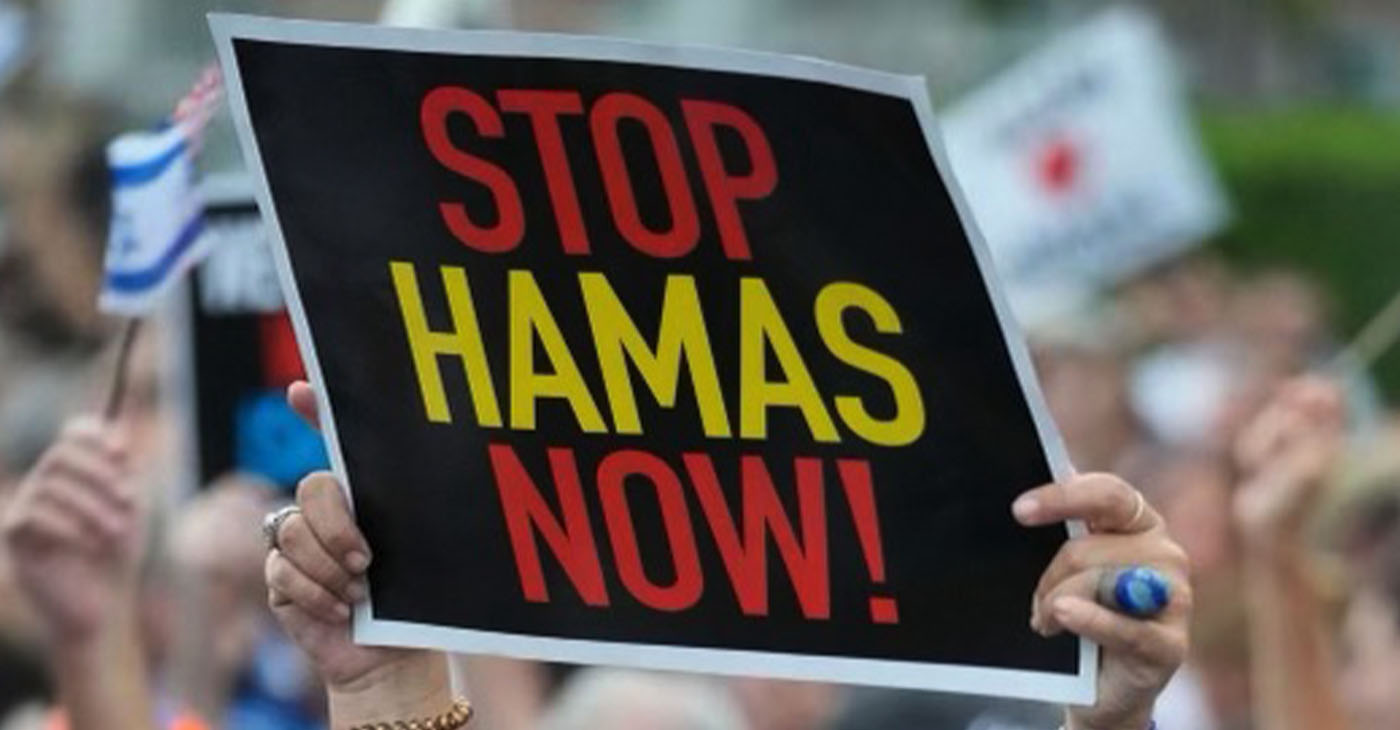
By Joe W. Bowers Jr.
California Black Media
OPINION
On Oct. 7, 2023, Hamas terrorists crossed the Israel-Gaza border and indiscriminately slaughtered Israeli civilians in their homes.
They killed nearly 300 young people at a music festival and took at least 200 hostages including 30 children. The atrocities they committed included massacres of families, abduction of the elderly and children, burning of babies and rapes of women.
The horrific surprise attack deserves universal and unequivocal condemnation. President Joe Biden called what Hamas did “an act of sheer evil” and pledged to defend the lives of Israelis and Jewish Americans.
He said, “Let there be no doubt. The United States has Israel’s back. We’ll make sure the Jewish and democratic state of Israel can defend itself today, tomorrow, as we always have.”
Hamas killed approximately 1,400 people including 32 Americans. Citizens from 40 different countries including the United Kingdom, France, Mexico, and Thailand were killed or reported missing.
Hamas fighters breached Israel’s border defenses on the final day of Sukkot while soldiers were away due to the holiday and launched attacks on 22 towns outside the Gaza Strip. This security lapse has been described as a catastrophic failure of Israel’s intelligence agencies..
Hamas is an extremist Islamist militant organization that has governed the Gaza Strip since 2007. It is recognized as an Iranian-backed terrorist group by the U.S. and the European Union and has a long history of violence against Jews and Palestinians, the latter of whom they often use as human shields.
While there have been plenty of groups who have unequivocally condemned the massacres, there are a number who haven’t, including organizations such as the Democratic Socialists of America (DSA), Black Alliance for Peace, Red Nation, and independent Black Lives Matter (BLM) chapters (excluding the national Black Lives Matter Global Network Foundation).
The DSA San Francisco chapter put out a statement on Oct. 9 that said, “Socialists support the Palestinian people’s, and all people’s, right to resist and fight for their own liberation. This weekend’s events are no different.”
Student organizations at a number of universities and colleges in California signed a solidarity statement titled “Resistance Uprising in Gaza” from Students for Justice in Palestine (SJP). The statement attributes the violence of the Hamas attack to what it refers to as Israeli apartheid and occupation.
The SJP statement written by Bears for Palestine at UC Berkeley says, “We support the resistance, we support the liberation movement, and we indisputably support the Uprising.” Essentially, these students are indirectly associating themselves with Hamas’ barbaric acts under the guise of “resistance.”
Signing the statement were 51 student organizations including those from Stanford, UC Berkeley, UCLA, UC Davis, UC San Diego, CSU Sacramento, and USC.
A statement signed by 34 Harvard student organizations said, “We, the undersigned student organizations, hold the Israeli regime entirely responsible for all unfolding violence.”
Many university leaders, where these students are enrolled, have been guilty of failing to unequivocally condemn Hamas and for inadequately addressing their students’ expressed support for Hamas.
Several Stanford faculty members, including three Nobel laureates, condemned Stanford’s administrators’ weak response to acts of terrorism and the expression of pro-Hamas sentiments by students on campus.
Israel unilaterally withdrew from Gaza in 2005. It dismantled 21 Israeli settlements in the territory and handed them over to the Palestinian Authority.
The assault by Hamas on Oct. 7 was not an ordinary clash with Israel. Hamas’ actions resulted in the deadliest single day for Jews since the Holocaust.
While there are valid reasons for protesting Israel’s treatment of Palestinians and a real reckoning with the Israeli government on its policies is long overdue, nothing justifies Hamas’ attack.
Israelis who were killed largely had nothing to do with the conditions of Palestinians in Gaza. Some of the victims weren’t even Israeli — they were just tourists.
The students blaming Israel for the atrocities committed by Hamas have faced criticism. Some groups have withdrawn their endorsements because of the backlash aimed at them. Others have doubled down on their activism. SJP held a “National Day of Resistance” on several campuses.
Several CEOs have asked Harvard to disclose a list of members from the organizations assigning responsibility to Israel to insure they do not hire any of their members. A Berkeley law professor has also urged firms not to hire his students who have publicly blamed Israel for the war.
This California Black Media report was supported in whole or in part by funding provided by the State of California, administered by the California State Library.
-

 Activism4 weeks ago
Activism4 weeks agoOakland Post: Week of March 27 – April 2, 2024
-

 #NNPA BlackPress4 weeks ago
#NNPA BlackPress4 weeks agoCOMMENTARY: D.C. Crime Bill Fails to Address Root Causes of Violence and Incarceration
-

 #NNPA BlackPress4 weeks ago
#NNPA BlackPress4 weeks agoFrom Raids to Revelations: The Dark Turn in Sean ‘Diddy’ Combs’ Saga
-

 #NNPA BlackPress4 weeks ago
#NNPA BlackPress4 weeks agoCOMMENTARY: Lady Day and The Lights!
-

 #NNPA BlackPress4 weeks ago
#NNPA BlackPress4 weeks agoMayor, City Council President React to May 31 Closing of Birmingham-Southern College
-

 #NNPA BlackPress4 weeks ago
#NNPA BlackPress4 weeks agoBaltimore Key Bridge Catastrophe: A City’s Heartbreak and a Nation’s Alarm
-

 #NNPA BlackPress4 weeks ago
#NNPA BlackPress4 weeks agoBaltimore’s Key Bridge Struck by Ship, Collapses into Water
-

 #NNPA BlackPress4 weeks ago
#NNPA BlackPress4 weeks agoBeloved Actor and Activist Louis Cameron Gossett Jr. Dies at 87


